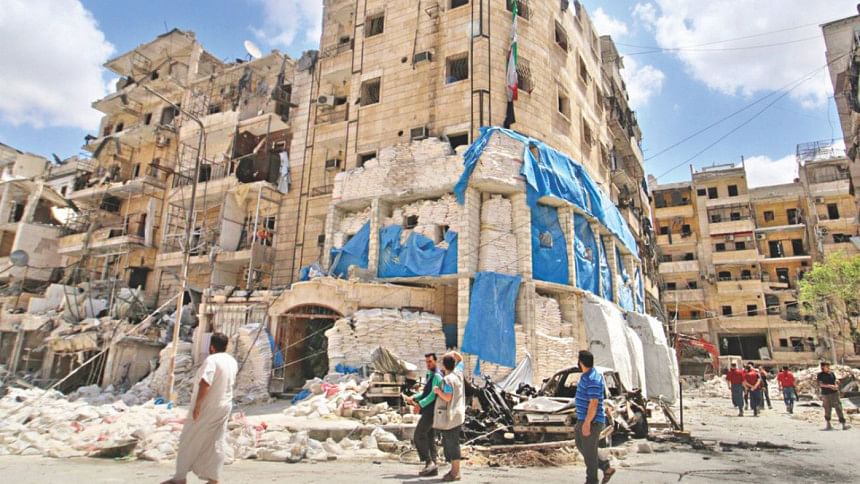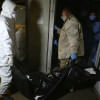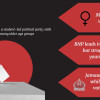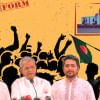A wake-up call for the UN

At 10pm two nights ago, the al-Quds hospital in the north Syrian city of Aleppo came under attack. With an airstrike, the 34-bed hospital which offered services including an emergency room, intensive care unit, operating theatre and the cities' main referral centre for paediatrics was completely destroyed.
Surrounded in darkness and dust, surviving patients, staff and volunteers began to dig out those caught in the rubble. Eight doctors worked full-time in the hospital, two of whom were among the 14 confirmed dead. Their dedication and commitment to providing medical care to those in need resulted in the ultimate sacrifice.
Sadly, this is not an isolated case. From Afghanistan to the Central African Republic, from South Sudan to Yemen and Ukraine, ambulances, hospitals and health centres have been bombed, looted, burned and destroyed. Patients have been killed in their beds; health workers have been attacked as they rescued the wounded.
A dangerous complacency is developing whereby such attacks are starting to be regarded as the norm. They are part of the tapestry of today's armed conflicts where civilians and civilian infrastructure are targeted, and marketplaces, schools, homes and health facilities are "fair game".
Between 2012 and 2014, in just 11 countries, the International Committee of the Red Cross (ICRC) documented nearly 2,400 attacks against health workers, patients, medical facilities and transport. The vast majority of these attacks were against local medical facilities and personnel, and the knock-on effects for the surrounding communities are devastating.
In South Sudan's Upper Nile region in July last year for example, a barrage of rockets landed near a hospital compound early one morning. The shrapnel sprayed the beige walls and blue fence and cut down those standing in the open.
A male patient, a 12-year-old boy and a three-year-old girl died instantly. In the days that followed more than 20 other people would die of their wounds, including the mother of the baby girl. As the fighting intensified, hospital staff, patients and civilians fled. Suddenly, an area serving 75,000 people was without a major medical facility. Many more people would die as a result.
In 2015, 75 Médecins Sans Frontières (MSF) hospitals and supported-hospitals suffered 106 bombing and shell attacks like this. Countless lives were lost and medical equipment destroyed. In September 2015, the World Health Organisation (WHO) reported that 654 medical personnel had been killed since the beginning of the conflict in Syria, and that almost 60% of hospitals were either partially functional or completely out of service.
In some ways, such statistics only do us a disservice, because they mask the individual tragedies of those caught up in conflict. Men, women and children, often in desperate need, see their lives torn apart by conflict. And then their last place of help – the hospital – comes under attack.
Who has been carrying out these attacks? Well, just about everyone. Armed forces, armed groups, yes, even governments that sit round the table at the United Nations. And let us be clear. It is not always "collateral damage". It can be systematic, planned, and deliberate and illegal. An attack on healthcare, whether intended or "accidental", is an attack on humanitarian law.
What we are witnessing is a sustained assault on, and massive disregard for, the provision of healthcare during times of conflict. Under international humanitarian law and principles, health workers must be able to provide medical care to all sick and wounded regardless of political or other affiliation, whether they are a combatant or not. And under no circumstances should they be punished for providing medical care which is in line with medical ethics. The doctor of your enemy is not your enemy.
But we are confronted with violations of these fundamental rules, with serious humanitarian consequences, for entire communities and healthcare systems that are already stretched to the limit. And this is not just the opinion of MSF and the Red Cross Red Crescent Movement.
That is why we, as the presidents of MSF and the ICRC, welcome the proposal for a landmark UN resolution to protect healthcare. But we urge the UN security council to make the resolution effective. First, it should send a powerful political message that healthcare needs to be protected. All parties to an armed conflict must fully comply with their obligations under international law, including humanitarian law. And they must clearly state their respect for the delivery of impartial medical care during times of conflict.
Second, it must urge states and all parties to armed conflict to develop effective measures to prevent violence against medical personnel, facilities and means of transport. States need to bolster, where appropriate, their legislation including by lifting restrictions and sanctions impeding impartial wartime medical care.
Armed forces and all parties to a conflict should integrate practical measures for the protection of the wounded and sick and for those engaged in medical work. These should be incorporated into orders, rules of engagement, standard operating procedures and training.
Third, it must acknowledge that when attacks on medical facilities and personnel do take place, there needs to be full, prompt, impartial and independent investigations to establish the facts. It cannot only be the victims or perpetrators who attempt to establish the facts. And there should be regular and formal reporting of such attacks at the highest level and an annual debate in the security council.
Underpinning everything has to be the acceptance that the medical needs of people – no matter who they are, where they are from or what side they support or fight for – must take precedence. Medical staff are present in areas of conflict in order to care for the sick and wounded, on the basis of need. And only need. This is the fundamental principle of impartiality and is the basis of medical ethics. It is the very fact that doctors treat on the basis of need – and are not involved in hostilities – that they can claim protection under international humanitarian law.
The UN resolution provides an opportunity. An opportunity to draw a line in the sand and prevent further attacks like that in Aleppo. States have the moral and legal responsibility to act, to protect people caught up in armed conflict. The time to act is now.
Peter Maurer is President of the International Committee of the Red Cross (ICRC) and Dr Joanne Liu is International President of Médecins Sans Frontières (MSF).
© The Guardian

 For all latest news, follow The Daily Star's Google News channel.
For all latest news, follow The Daily Star's Google News channel. 








Comments